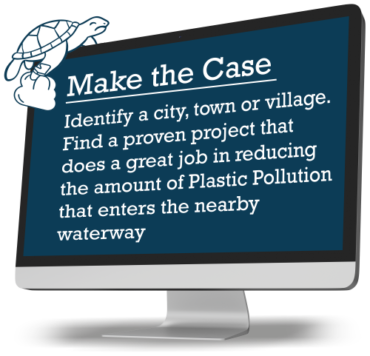
Awards
Each Case Study entry eligible to win the following:
- First Place Overall Award
- Best Case Study in this Theme
- Runner-Up in this Theme
*Note: Season 1’s winning organizations are excluded from the Season 2 competition:
1) Kabadiwalla Connect
2) Bharat Petroleum’s plastic in roads
3) Rudra Environmental
4) Akshar Foundation
5) Project Mumbai
6) Project Bhopal
7) Shayna EcoUnified
8) Banyon Nation
9) Plastics for Change
Theme 1: Identify a city, town or village. Find a proven project that does a great job in reducing the amount of plastic waste that enters the nearby waterway
As the articles in the research section attest, there is no shortage of information about the plastic pollution problem in India and the Subcontinent’s rivers, waterways, and the ocean. While the Ganges is featured as the river with the largest plastic waste problem, every river, in theory, has the same problem that the Ganges has – that there are multiple ways plastic waste can enter our waters via large cities, towns and villages along its banks and tributaries.
Organizing a one-off cleanup day is great, effective, and a super way to drive awareness among volunteers and the public, but soon after, the beaches and banks are refilled with a never-ending supply of plastic pollution. This theme is not about one-day a year cleanups, or even once-per quarter cleanups. For the Case Study, they select in the Make the Case Competition, the student team should seek out projects and programs that tackle plastic waste at its sources, i.e., on land.
Solutions can include ideas like the following; 1) better ways to capture (stop) plastics before it ends up as street litter and winds its way to the water; 2) community-based organizing and awareness programs that change how people use plastics and dispose of plastic waste; 3) proven technologies used by municipal waste collection and treatment departments; 4) how a municipality rewards and engages waste pickers as the last line of defense to pick up waste in the streets; and 5) and many other programs and projects used as tools to reduce, recycle and reuse plastics by cities, towns and villages along rivers. These programs and projects can be led by local government (driven by regulations or not), by NGOs (possibly with a company(s) in the area, or by the community leaders themselves.
With literally thousands of cities, towns and villages in India, it is very likely that there are some great projects or programs that are effective – and these may be replicated and scaled to work elsewhere in India and the Subcontinent.
For the Case Study, student teams will be tasked with “making the case” that the project or program selected could be replicated and scaled, the how and the why.
It is important to note that a project or program does not have to be comprehensive or complex. It could be a simple solution that saves a few kilograms a day, but it could be scaled to thousands of use cases throughout India and the Subcontinent, for example. It could be a for-profit solution for an industry, for a government school system or program, for a waste management company, or through NGOs.
The key to the Case Study is that the project or program selected has a proven track record, can be easily replicated and scaled — that’s the challenge for the student teams.
TAKE A DEEPER DIVE
We put together a list of resources and types of projects to help you in selecting your solution, and writing your case study
Resources
Types of Potential Projects
The PCC Codes (or Plastic Category Classification Codes) were developed for a report, funded by the United Nations and written by the Ocean Recovery Alliance. The PCC Codes are based on the analysis of 580 voluntary commitments made by global stakeholders from 2014-2018. Main Source: https://oceanconference.un.org/commitments/
For student teams, the PCC Codes should illustrate the wide variety of programs and project areas to search that stakeholders have used (as voluntary commitments) when tackling the problem of plastic pollution. In other words, fighting plastic pollution is not just about beach cleanups.
